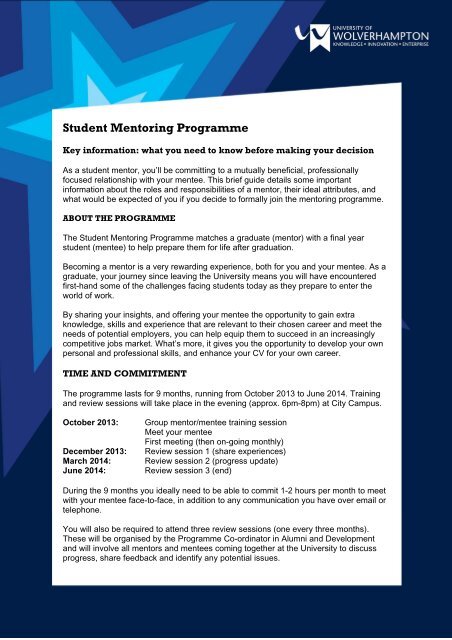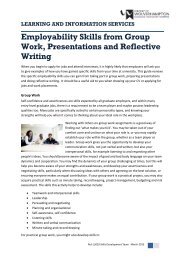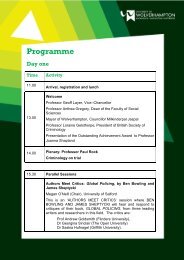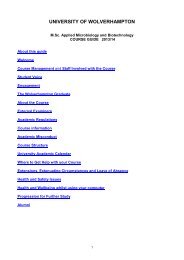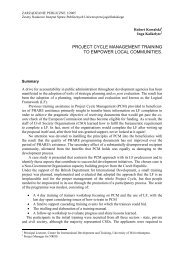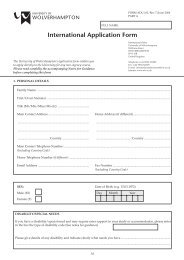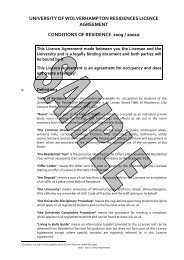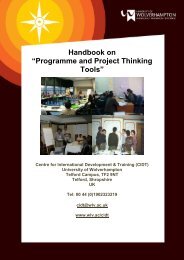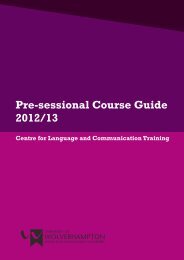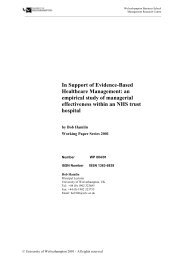Student Mentoring Programme - University of Wolverhampton
Student Mentoring Programme - University of Wolverhampton
Student Mentoring Programme - University of Wolverhampton
Create successful ePaper yourself
Turn your PDF publications into a flip-book with our unique Google optimized e-Paper software.
<strong>Student</strong> <strong>Mentoring</strong> <strong>Programme</strong><br />
Key information: what you need to know before making your decision<br />
As a student mentor, you’ll be committing to a mutually beneficial, pr<strong>of</strong>essionally<br />
focused relationship with your mentee. This brief guide details some important<br />
information about the roles and responsibilities <strong>of</strong> a mentor, their ideal attributes, and<br />
what would be expected <strong>of</strong> you if you decide to formally join the mentoring programme.<br />
ABOUT THE PROGRAMME<br />
The <strong>Student</strong> <strong>Mentoring</strong> <strong>Programme</strong> matches a graduate (mentor) with a final year<br />
student (mentee) to help prepare them for life after graduation.<br />
Becoming a mentor is a very rewarding experience, both for you and your mentee. As a<br />
graduate, your journey since leaving the <strong>University</strong> means you will have encountered<br />
first-hand some <strong>of</strong> the challenges facing students today as they prepare to enter the<br />
world <strong>of</strong> work.<br />
By sharing your insights, and <strong>of</strong>fering your mentee the opportunity to gain extra<br />
knowledge, skills and experience that are relevant to their chosen career and meet the<br />
needs <strong>of</strong> potential employers, you can help equip them to succeed in an increasingly<br />
competitive jobs market. What’s more, it gives you the opportunity to develop your own<br />
personal and pr<strong>of</strong>essional skills, and enhance your CV for your own career.<br />
TIME AND COMMITMENT<br />
The programme lasts for 9 months, running from October 2013 to June 2014. Training<br />
and review sessions will take place in the evening (approx. 6pm-8pm) at City Campus.<br />
October 2013:<br />
December 2013:<br />
March 2014:<br />
June 2014:<br />
Group mentor/mentee training session<br />
Meet your mentee<br />
First meeting (then on-going monthly)<br />
Review session 1 (share experiences)<br />
Review session 2 (progress update)<br />
Review session 3 (end)<br />
During the 9 months you ideally need to be able to commit 1-2 hours per month to meet<br />
with your mentee face-to-face, in addition to any communication you have over email or<br />
telephone.<br />
You will also be required to attend three review sessions (one every three months).<br />
These will be organised by the <strong>Programme</strong> Co-ordinator in Alumni and Development<br />
and will involve all mentors and mentees coming together at the <strong>University</strong> to discuss<br />
progress, share feedback and identify any potential issues.
YOUR ROLE<br />
A mentor:<br />
Manages the relationship<br />
Encourages<br />
Nurtures<br />
Teaches<br />
Offers mutual respect<br />
Responds to the mentee’s needs<br />
Supports at all times<br />
As a mentor your role is to build a relationship with your mentee based on trust and<br />
mutual respect, and through identifying their needs, support them with practical advice,<br />
opportunities to develop their skills, and enhance their experience <strong>of</strong> the working world.<br />
Mentors should have the skills to:<br />
Improve the mentee’s breadth <strong>of</strong> knowledge<br />
• Share examples, information and resources<br />
• Share critical knowledge<br />
• Share a broader perspective <strong>of</strong> organisations, culture and strategy<br />
• Provide contacts/networks for mentees to follow up (if appropriate)<br />
• Share own experiences and career decisions made<br />
Improve the mentee’s breadth <strong>of</strong> skills<br />
• General skills such as communication, time-keeping, organisation and<br />
prioritising<br />
• Specific skills relevant to their chosen career route (e.g. creating a portfolio <strong>of</strong><br />
work)<br />
• Interview skills, CV writing and application forms<br />
• Pr<strong>of</strong>essional work conduct<br />
Help mentees to articulate their aspirations and realise their potential<br />
• Inspire to excellence<br />
• Offer challenging ideas<br />
• Stimulate creative thinking<br />
• Encourage winning behaviour – role model behaviour<br />
Raise the mentees self-confidence<br />
• Offer encouragement<br />
• Recognise and reward positive change in behaviour<br />
• Provide tailored, accurate and regular feedback<br />
• Trigger self-awareness and encourage reflection
YOUR RESPONSIBILITIES<br />
• Meet with your mentee when agreed<br />
• Manage time commitments<br />
• Work with your mentee to identify their needs and agree priorities (driven by<br />
mentee)<br />
• Prompt mentee to draw up their own personal development plan (PDPs)<br />
• Initiate reviews <strong>of</strong> progress at regular intervals<br />
• Ensure confidentiality as agreed with mentee<br />
• Confront and reflect on positive and less positive behaviours/actions<br />
• Prompt mentee to keep the <strong>Programme</strong> Co-ordinator in Alumni and<br />
Development updated on progress<br />
• Manage feelings/emotions when closing down the formal relationship<br />
WHO MAKES A GOOD MENTOR?<br />
We are first and foremost looking for dedicated and enthusiastic alumni who have a<br />
genuine interest in seeing people advance. You may also identify yourself as having the<br />
following:<br />
• A wide range <strong>of</strong> relevant skills to pass on<br />
• A good understanding <strong>of</strong> your potential mentee’s context<br />
• Patience with good interpersonal skills<br />
• Sufficient time to devote to the relationship<br />
• Ability to command respect<br />
• A relevant network <strong>of</strong> contacts and influence<br />
• Recognition <strong>of</strong> your own development and support needs<br />
• A continued desire to learn<br />
NEXT STEPS<br />
If you think you’ve got what it takes to be a mentor and you’re still interested in joining<br />
the programme, then all you need to do is complete our Mentor Enrolment Form and<br />
email it to Amy Roberton in Alumni & Development at: a.roberton@wlv.ac.uk<br />
CONTACT US<br />
Alumni & Development<br />
<strong>University</strong> <strong>of</strong> <strong>Wolverhampton</strong><br />
MX Building, City Campus North<br />
Camp Street<br />
<strong>Wolverhampton</strong><br />
WV1 1AD<br />
Email: alumni@wlv.ac.uk<br />
Tel: 01902 323056 / 1157


